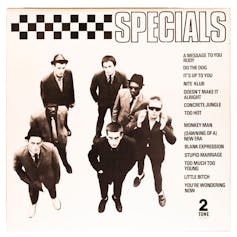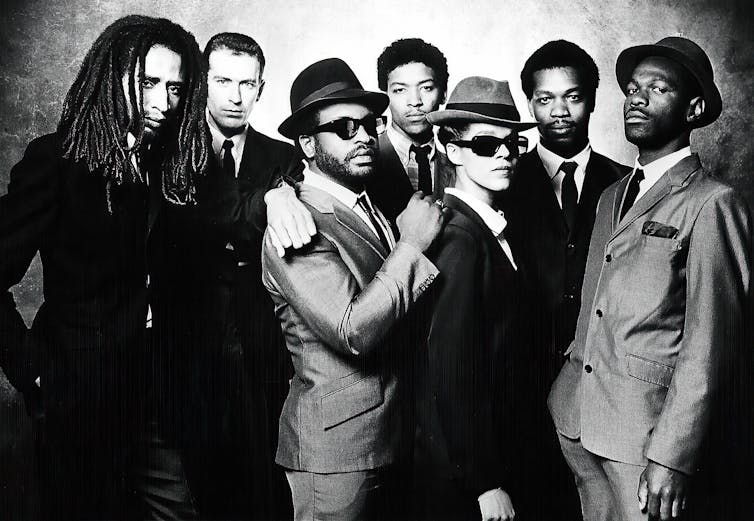This City, Peaky Blinders creator Steven Knight’s newest drama for the BBC, brings to life a defining – if short-lived – period within the historical past of British youth tradition and standard music. Set within the West Midlands towards the backdrop of industrial decline and social unrest within the early Eighties, the drama unfolds to the syncopated sounds of 2-Tone.
A livid mixture of punk and Jamaican ska, 2-Tone turned a genuinely nationwide phenomenon, bursting out of a bedsit in Coventry and into the charts and the favored consciousness.
We all know rather a lot in regards to the city multiracial landscapes of its Midlands origins, out of which its twin beliefs of racial unity and musical hybridity sprang. However we all know a lot much less about the way it resonated with the expertise of younger folks past the massive cities and cities.

Razorpix / Alamy
Such concerns are well timed. It’s now 45 years because the founding of 2-Tone Information by Jerry Dammers, organist and songwriter for ska’s most well-known band The Specials, and mastermind of the entire motion.
In fact, 1979 was additionally a decisive 12 months for politics within the UK. However bands like The Specials did extra than simply soundtrack the civil strife of the early Thatcher years; they really impressed political and cultural change.
To know how they did so is necessary not just for historic causes. A deeper sense of how anti-racist and multicultural concepts have formed much less culturally various areas could enrich modern debates over racism, notably rural racism, which have turn into more and more polarised.
My very own ongoing oral historical past mission with folks from the Dorset area registers the highly effective impact 2-Tone had in much less racially blended areas. Interviewees communicate vividly of the power, pleasure and unruliness of attending gigs, in addition to the sense of shared neighborhood, belonging and togetherness.
No person is particular
As The Specials’ first single, Gangster, hit the airwaves in the summertime of 1979 and the primary 2-Tone tour opened within the autumn (with assist from fellow labelmates The Selecter and Insanity), a rising legion of youth clad in slim-fit mohair “tonic fits”, pork-pie hats, and black-and-white checkerboard greeted the bands as they made their method throughout the nation. By the point all three bands appeared collectively on High of the Pops that November, 2-Tone had swept the nation.

Information / Alamy
The Specials, specifically, constructed an ethos on the concept that “no one is particular”, refusing the division between band and viewers (symbolically represented within the viewers becoming a member of the band on the stage for the ultimate numbers).
The inaugural tour coated the size and breadth of the nation, reaching musical outposts like Aberdeen, Ayr, Blackburn, Bournemouth, Plymouth and Swindon. A seaside tour adopted in 1980, winding its method via a number of English coastal cities, from Blackpool to Worthing.
One interviewee described how 2-Tone bands made a giant deal of shifting out into the distant areas and bringing the music to the folks. That made them extra accessible, setting them aside from different bands of the interval.
For one fan from Weymouth, travelling as much as that first Bournemouth gig was a robust unifying expertise:
You simply didn’t realise that you just have been a part of a much bigger factor…While you get in there and everybody’s received the identical angle, the identical outlook, the identical sense of goal and sense of place – it was actually fairly an incredible feeling.
Enjoying venues in far-flung locations was a part of the 2-Tone mission. For Dammers and others, the anti-racist message was aimed immediately and primarily at white youth. These 2-Tone bands sought to achieve audiences with a visible and aural show of unity. The symbolism had a profound affect. As one other interviewee recalled:
Teams have been both all white or all black…2-Tone was the very first thing the place you truly noticed white and black musicians on stage collectively…That was a large distinction.
However not everybody abruptly turned a staunch anti-racist. Some merely went for the music, the dancing and the great instances. However for others the unity of politics, fashion and music reduce throughout divisions amongst fractious youth cults and towards far-right influences. Embracing the spirit of 2-Tone gave rural and small-town youth a method of expressing anti-racist politics in a extra native idiom.
Race and racism right this moment
Regardless of the contribution of 2-Tone – and earlier than it, Rock towards Racism – to anti-racist struggles, problems with racism have by no means gone away. The battle towards far-right nationalism and police brutality continues, however more and more the highlight has shifted in the direction of the extra delicate and unseen methods during which racism is perpetuated. This ranges from on a regular basis microaggressions to the lingering shadow of Britain’s imperial legacy, attracting a robust backlash in some quarters.
Current proof of rural racism, for instance, has been met with swift dismissals. The previous house secretary Suella Braverman was fast to disclaim others’ expertise of racism, stating that the declare the countryside is racist is likely one of the most ridiculous examples of left-wing id politics – simply because there are extra white folks than non-white folks someplace doesn’t make it racist.
Recalling the instance of 2-Tone and The Specials could encourage a eager for an easier time, when racists have been simple to identify; issues are extra sophisticated right this moment. Nonetheless, it could assist us to grasp how racial solidarities are cast, notably in and thru social and geographical variations. For my interviewees, 2-Tone’s ska revival was not a passing fad; it allowed them to reinterpret their very own expertise of sophistication, race and locality.
If just for a second, 2-Tone mania dominated Britain, within the phrases of the music critic Simon Reynolds. However as This City reveals, its wealthy and sophisticated legacies can nonetheless be introduced powerfully to life within the current.




